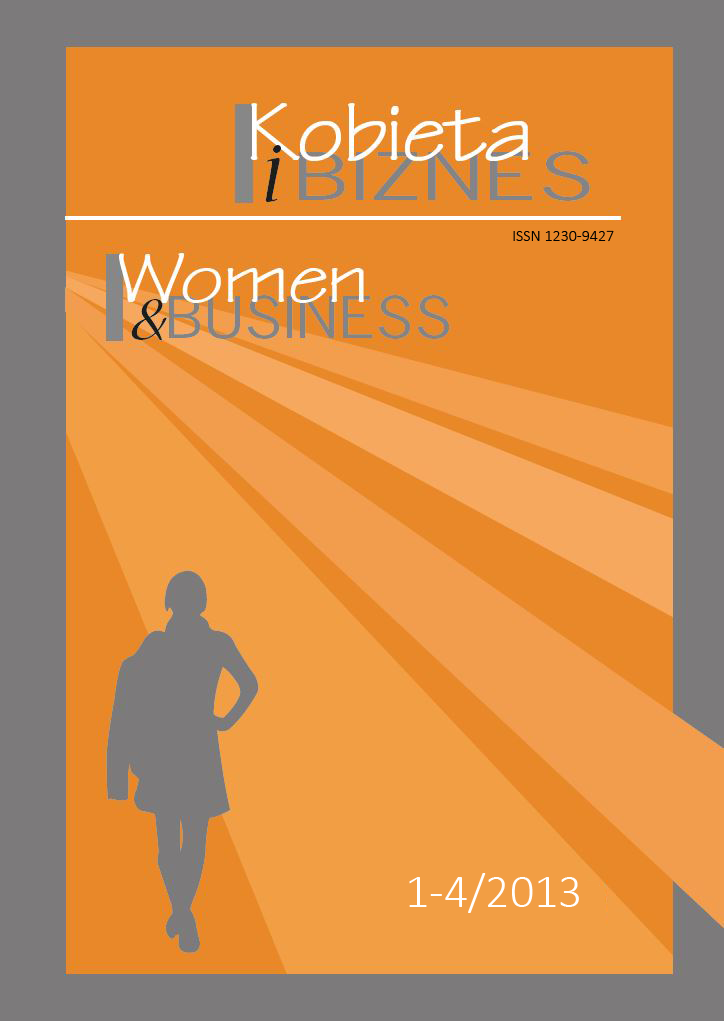The impact of diversity management on the enterprise competitiveness: analysis on reports of fi nancial institutions and consulting companies - selected aspects
Main Article Content
Abstract
Globalization, as well as regionalization in the period of economic deceleration, and exhausting of "simple" reserves of economic growth cause the need to pay more attention to social, environmental and ethical issues. The strategy of sustainable development, which ensures equilibrium of three elements - economy, ethics and ecology, is becoming increasingly signifi cant. Development of this tendency is particularly visible in Western Europe countries, with high GNP per capita values. One of the effects of a sustainable approach towards economy is that fact that enterprises take into wider consideration social aspects, in respect to both theirown employees (taking care of the balance between work and private life, ensuring development opportunities, equal treatment), as well as other interested parties, e.g. clients, suppliers, universities, media, local authorities, and in case of network companies, e.g. transport-forwarding tradelogistics, also territorial units where the terminals are situated. Social responsibility also means taking care of natural environment and comply with legal standards obligatory in a particular country, as well as eventuating from international treaties ratifi ed by a particular country. The issue of social responsibility was fi nally regulated. Its normative regulation was included in the ISO 26000 norm, published in November 2010. According to this norm, social responsibility means obliging organization (business, non-governmental or administrative) to implementation of social and environmental aspects into the decision making process and assuming responsibility for their effects on society and environment. The presented paper indicates various aspects of diversity management, mainly the enterprise's fi nancial indicators. The analysis used reports of financial institutions in order to prove the thesis that gender diversifi cation on corporate boards allows obtaining higher proceeds and profi t, particularly during economic stagnation and recession.
Article Details
Authors retain copyright and grant the journal right of first publication with the work simultaneously licensed under a Creative Commons Attribution License that allows others to share the work with an acknowledgement of the work's authorship and initial publication in this journal. All authors agree for publishing their email adresses, affiliations and short bio statements with their articles during the submission process.
Author agrees to share his work under CC-BY-NC license.
References
2. Baumeister R.F., 2011, Zwierzę kulturowe. Między naturą a kulturą, Wydawnictwo Naukowe PWN, Warszawa.
3. Deloitte, 2012, Kobiety i władza w biznesie. Czy płeć ma znaczenie dla budowania pozycji i wpływu w organizacji?, Warszawa.
4. Diversity Index, 2013, Przewodnik po zarządzaniu różnorodnością, Konfederacja Lewiatan, Warszawa.
5. Gender Equity Index, 2012, www.socialwatch.org
6. Gołębiowska E. (red.), 2013, Zarządzanie XXI wieku. Menedżer innowacyjnej organizacji, Społeczna Akademia Nauk, Łódź.
7. Hausman R., Tyson L.D., Zahidi S., 2012, The Global Gender Gap Report, World Economic Forum.
8. Hoogendoom S., Oosterbeek H., Praag M. van, 2013, The Impact of Gender Diversity on the Performance of Business Teams: Evidence from a Field Experiment, "Management Science", July, No. 59, p. 1514-1528.
9. Institute of Leadership and Management, 2011, Ambition and Gender Report.
10. Kahnemann D., 2012, Pułapki myślenia. O myśleniu szybkim i wolnym, Media Rodzina, Poznań.
11. Raport 2013: Portret finansowy Polki 2013, 2013, Deutsche Bank Private & Business Clients, Warszawa.
12. Sedlacek T., Orrell D., 2012, Zmierzch Homo Economicus, Studio Emka, Warszawa.
13. Sedlacek T., 2012, Ekonomia dobra i zła. W poszukiwaniu istoty ekonomii: od Gilgamesza do Wall Street, Studio Emka, Warszawa.
14. Sustainable development: The right to a future, 2012, Social Watch Report.
15. Wooley A.W. et al., 2010, Evidence for a Collective Intelligence Factor in the Performance of Human Group, Publisher on-Line, September, Science Magazine, No 330.

